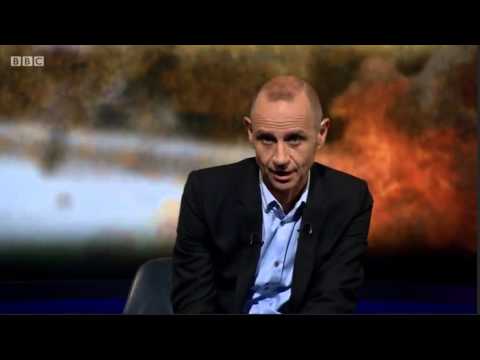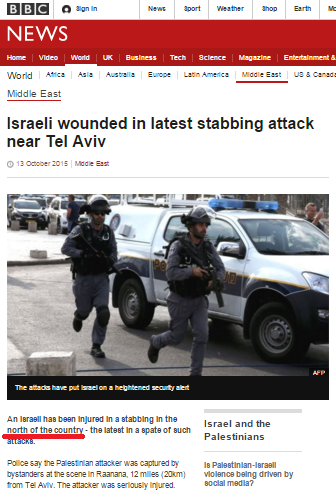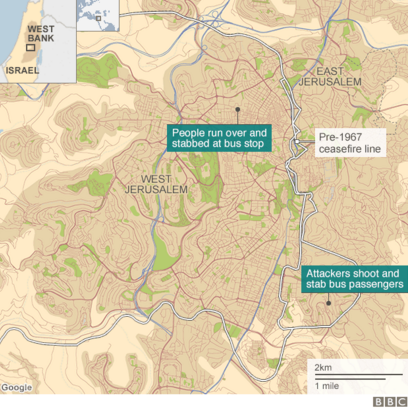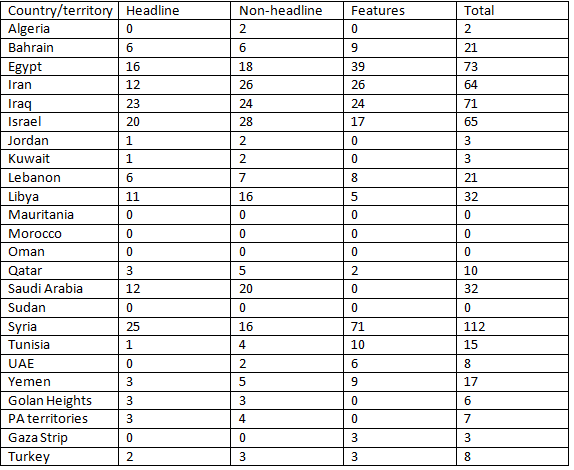h/t @SussexFriends
October 13th (a day designated in advance as one of the proverbial ‘Days of Rage’ by Hamas and other Palestinian groups) saw two major terror attacks in Jerusalem and two stabbing attacks in Ra’anana – which was inaccurately described by the BBC as being “in the north of the country” (as well as “near Tel Aviv”) in a written report on the incident which appeared on the BBC News website.
In the later BBC News website report on the Jerusalem attacks, audiences were told that the neighbourhood of East Talpiot is a “Jewish settlement in East Jerusalem” whilst in fact the area was defined as ‘no-man’s land’ under the terms of the 1949 Armistice Agreement.
BBC audiences saw the 1949 Armistice Lines bizarrely portrayed as the “pre-1967 ceasefire line” in a map inserted into the report and as ever, no effort was made to inform readers that the Armistice Agreement specifically defined the ceasefire line as not constituting a border.
On the evening of October 13th, an item concerning the day’s events was broadcast on the flagship BBC Two news programme ‘Newsnight’, with presenter Evan Davis speaking to the BBC’s Middle East editor.
As readers may recall, the rationale given for the creation of the post of ‘Middle East editor’ a decade ago is as follows:
“The challenge for our daily news coverage is to provide an appropriate balance between the reporting of a ‘spot news’ event and the analysis that might help set it in its context.
This challenge is particularly acute on the television news bulletins, where space is at a premium, and because the context is often disputed by the two sides in the conflict. To add more analysis to our output, our strategy is to support the coverage of our bureau correspondents with a Middle East editor.
Jeremy Bowen’s new role is, effectively, to take a bird’s eye view of developments in the Middle East, providing analysis that might make a complex story more comprehensive or comprehensible for the audience, without the constraints of acting as a daily news correspondent. His remit is not just to add an extra layer of analysis to our reporting, but also to find stories away from the main agenda.”
However, in this interview Jeremy Bowen actively hindered the provision of analysis and context which would have helped audiences comprehend the day’s events and their wider background.
Evan Davis’ introduction to the item included a presentation of the first Intifada which once again misled audiences by stating that the violence was directed exclusively at soldiers and erasing Israeli civilian casualties from the picture.
Davis: “Well, they’re using the word Intifada again on the West Bank and in Israel. Attacks by Palestinians on Israeli Jews have increased in recent days – from the sporadic to the frequent. The first Intifada ran from 1987 to 1993 and mainly consisted of young people throwing stones and Molotov cocktails…ah…at Israeli troops. The second Intifada ran from 2000 to 2003 and involved suicide bombings and gun battles. Is the current wave of violence a third Intifada?”
Downplaying the pre-issued call for a ‘Day of Rage’ and the incitement and encouragement of violence that obviously produces, Davis went on:
“Well today was labelled a ‘Day of Rage’ by Palestinian groups. Attacks came thick and fast. This was the scene in central Jerusalem where a Palestinian ran his car into a queue at a bus stop, crushing some bystanders, attacking others with a meat cleaver. In a separate attack a sixty year-old Rabbi was killed while riding a bus. He was buried by his grieving community shortly afterwards.”
One might have thought that the BBC would at least have made an effort to report those details accurately. In fact Rabbi Yeshayahu Krishevsky was murdered in the first attack described by Davis in Makor Baruch and not in the scantily portrayed attack on the bus in East Talpiot in which two other people were also murdered and fifteen wounded. Davis continued:
“Anger is building in Gaza and on the West Bank where parts of Bethlehem have resembled a battle ground. Ah…just before we came on air I spoke to the BBC’s Middle East editor Jeremy Bowen and I asked him if these Palestinian attacks are just the work of individuals or if there’s something more organized going on.”
Despite Hamas having rushed to clarify its association with one of the two terrorists who carried out the attack on the bus in East Talpiot and despite information concerning the fact that the second perpetrator of that attack was affiliated with Fatah and the terrorist who attacked Rabbi Krishevsky and others was the cousin of one of the terrorists who carried out the Har Nof attacks last year already being in the public domain by the time Bowen went on air, ‘Newsnight’ viewers heard the following uninformative reply from Bowen.
“There’s obviously a lot of people talking about what’s going on. Everybody is aware of what’s happening. It doesn’t seem to be organised. Eh…and I think the seemingly random nature of it is a major reason why the Israelis are finding it hard to combat it; to come up with an answer.”
Jeremy Bowen obviously had no intention of clarifying to viewers that a declaration of a ‘Day of Rage’ is an organized call to Palestinians to commit acts of violence. Davis then asked:
“I mean, what about average opinion in the Palestinian community – communities? Do they feel they are heroes or do they feel these people are just stirring up trouble inappropriately? What is the mood?”
That question of course presented Bowen with an ideal opportunity to inform BBC audiences about the incitement and glorification of the terrorists by Hamas, Fatah, the PLO, Palestinian Authority officials and related media outlets and the effects of those factors on the mood on the Palestinian street. He could, for example, have mentioned the martyrdom posters bearing Fatah insignia and Mahmoud Abbas’ photograph. He could have reported Abbas’ statement that “Every drop of blood spilled in Jerusalem is pure, every shahid [martyr] will reach paradise, and every injured person will be rewarded by God” and his remarks about Jews’ “dirty feet”.
But the man whose job description specifically obliges him to provide BBC audiences with analysis and context side-stepped that question, instead framing of the story to focus audience attention on a politically partisan narrative which erases the religiously themed incitement fueling this latest wave of terror from audience view.
“I think there’s a lot of worry, actually, about where this is going. I think that there is…err….there’s a lot of anger and rage at the continuing occupation and the fact is that the underlying context of all the violence that really ever happens here to do with the conflict is the conflict itself and the almost fifty year occupation of the Palestinian territories by the Israelis and that generates a sense of hopelessness, of hatred and – in some people as well – murderous rage. But among the Palestinians I’ve spoken to on this trip since I’ve been here, there’s a lot of worry about just where this is going.”
No less obvious framing appeared towards the end of the item when Bowen promoted the notion of equivalence between Israeli victims of terrorism murdered whilst going about their everyday business and Palestinians engaged in violent rioting.
“The British have put out a statement today saying that…err…condemning, of course, the Palestinian attacks but also saying to the Israelis show restraint in terms of dealing with demonstrations because there have been a lot of people killed as well – including children – on the Palestinian side as the Israelis moved to…err…to err…respond to the kind of things that have been going on.”
Once again, BBC audiences have been sold short by the man whose job it is to ensure that they have the background information and context necessary for them to understand events in the Middle East.








